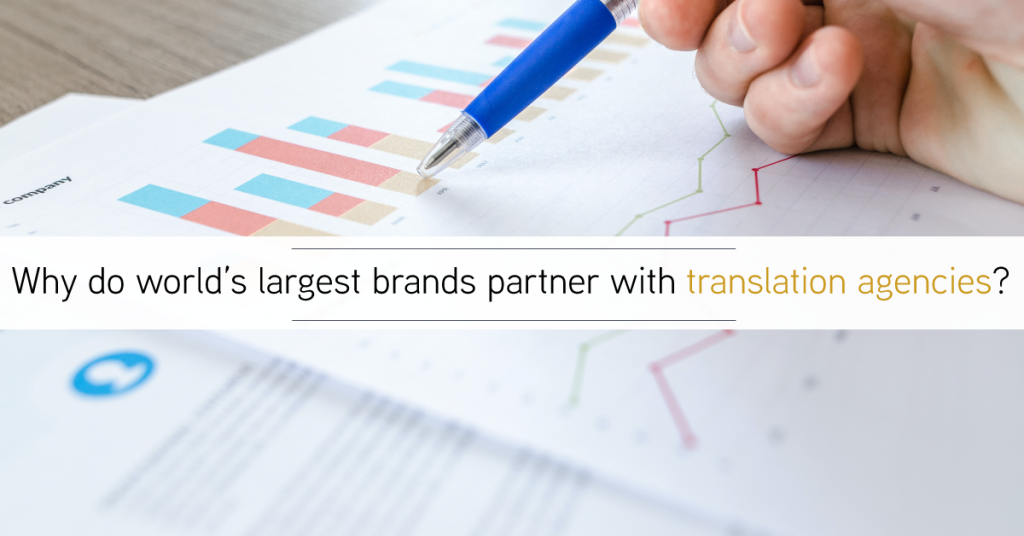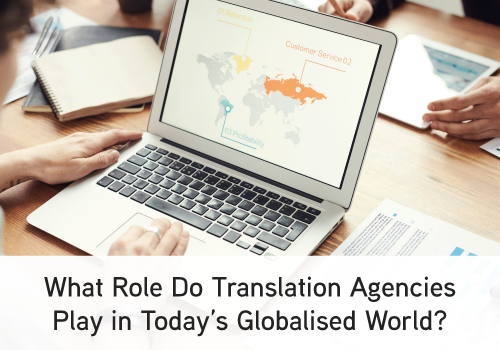Why Do the World’s Leading Brands Work with Translation Agencies?
Did you know that some of the biggest brands and organisations in the world work with professional translation agencies? And there’s a very good reason for that. Companies which operate globally or within multicultural markets understand the value of clear and accurate communication. By working with a certified translation agency, such as TS24, they can ensure that their brand message is effectively conveyed in different languages and that it is fully suitable for the market’s culture.
The way in which businesses approach international markets has changed dramatically over the last 10 years ago. Just a decade or so ago, companies tended to use a one-size-fits-all approach to target markets, typically delivering generic campaigns in English. This era of convenience in marketing is, however, long gone today.
Now, with rapid globalisation and similar trends/fashions being popular across the globe, consumers in different countries and micro-markets better understand their individual value within the global marketplace.
As a result, companies had to adjust their strategies in order to build a strong position abroad and successfully acquire international customers.
Some of the world’s largest and most successful companies, such as Nike or McDonald’s, understand this shift in consumer behaviour, and so their campaigns are usually wholly tailored for each of the specific markets they are targeting. Such companies spend plenty of their time and resources in order to ensure that any socio-demographic and cultural aspects are fully considered and completely embodied when approaching an overseas audience without affecting the company’s core values and brand image as a whole.
One of the most important socio-cultural factors is the correct use of the audience’s native language. As a result, a rapidly growing number of businesses and organisations have decided to partner and work with professional translation agencies, which are not only able to translate content accurately but also ensure that the content is culturally suitable for the target audience whilst keeping the company’s ethics in mind.
TRANSLATION EXPERT’S TIP: Want to learn how translation services adapt to the changes in language? Make sure to read our expert’s article here!
The importance of language
Language is, without a shadow of a doubt, one of the most important aspects of any culture. It plays a key part in the socio-cultural behaviours of consumers in practically any country. As societies have developed and grown over the centuries, forming their own customs, beliefs and values, languages have grown alongside of them. As a result, they are very often closely intertwined with the cultural aspects.
For instance, some cultures, particularly in Asia, pay special respect to their elders and hierarchies, e.g. in the workplace. Consequently, languages in these countries have evolved in ways which allow them to reflect this fully. On the contrary, the majority of Western and European countries tend to be somewhat more relaxed, and so we can also witness this in the way the language is used within societies and hierarchies.
Interestingly, a recent study by the Common Sense Advisory showed that more than 90% of EU respondents asked, strongly or very strongly agree, that they would be more likely to complete a purchase if the brand provided key information in their native language. An astonishing 40% of people asked said never to buy products if they were not able to read about it in their mother tongue. With predictions indicating a strong economic recovery from the recent COVID-19 outbreak, these numbers seem even more substantial.
As you can see, the correct use of language by brands and organisations can directly influence how well they do in foreign markets and when trading with international consumers, which is then, as a result, directly reflected in their revenue.
EXPERT’S TIP: Are you wondering what ‘certified translation’ means and what are the different types of official translations? Read our latest article!
Benefits of Translations For Your Business
With a change in consumer behaviour and a shift in the way organisations now market themselves internationally and within foreign markets, a growing number of UK business owners have begun to see the full extent of benefits a partnership with a professional translation agency can bring to the table. Today, translation services are practically an inseparable part of any successful internationalisation venture across all corporate sectors.
Nowadays, a brand which intends to successfully approach international consumers and business partners must do so in a manner which is completely different than it was just 10 or 15 years ago.
As the world became globalised due to technological advances, although trends and fashions developed across borders, consumers in individual markets now better understand their particular significance within the global marketplace. As a result, they respond better to campaigns which are highly tailored to their specific customs, beliefs and way of life, and the correct use of their native language is one of the key factors within such an approach.
An in-depth research by the CSA (Common Sense Advisory) found that global businesses that invest in professional translation services see much higher revenues. The study quotes: “Businesses that augmented their translation budget were 1.5 times more likely than their Fortune 500 peers to report an increase in total revenue.” In the study, we can also learn that “The companies that translated information in order to communicate with and retain their partners were 2.67 times more likely to experience revenue increases. They were also 2.6 times more likely to generate improved profits.”
Communicate With Your Global Business Partners
Although approaching potential customers in their native language and growing sales within an international marketplace is the key benefit that working with translation agencies can bring, it’s also key to note the importance of language transitions when dealing with your busiesness partners.
When approaching a foreign market, suppliers, delivery companies, employees, legal support, or marketing firms may all be based abroad. Consequently, it may be necessary to translate all relevant materials, such as legal documents, contracts, warranties, marketing campaign plans, etc., into a language they can fully and easily understand.
The Role of Translation Agencies in Today’s World
The role of professional translation agencies in today’s globalised world is definitely worth discussing. As the world became more and more globalised, translation agencies became increasingly important within the international business environment. As companies now trade within a ‘global village’, translation services which take into account cultural and socio-demographic aspects of a target audience are essential.
It’s also interesting to note that the role of a professional translation agency within the business world has changed considerably over the last 10 years or so. Today, certified translation services often extend to much more than simple word-for-word translations or interpreting.
Clients now fully understand that language is one of the most significant aspects of a business’s internationalisation, and so translation agencies work closely with them in order to build a strong international presence. There are several examples of businesses which have neglected the translation of their content and, as a result, unfortunately failed within their new target market.
Although translating and interpreting are still two of the most popular services within the industry, in recent years, we have seen a dramatic growth in clients requiring other language services such as transcreation or multilingual copywriting. As we work solely with native speakers of the target language, a number of organisations also rely on us when it comes to socio-cultural advice, which in many ways is perhaps one of the greatest benefits of working directly with professional translation agencies.
About TS24
Translation Services 24 (TS24) is a certified translation agency offering expert services in over 200 languages. We work with clients in all corporate and public industries and specialise in sector-specific linguistic solutions. With over a decade of experience in the industry, 15+ million words converted every year and 100,000+ projects completed, TS24 is a leading provider of expert translations and interpretation services and an officially certified member of the ATC. Contact TS24 here. You can also read all of our recent articles here.
Follow Translation Services 24 on Social Media







